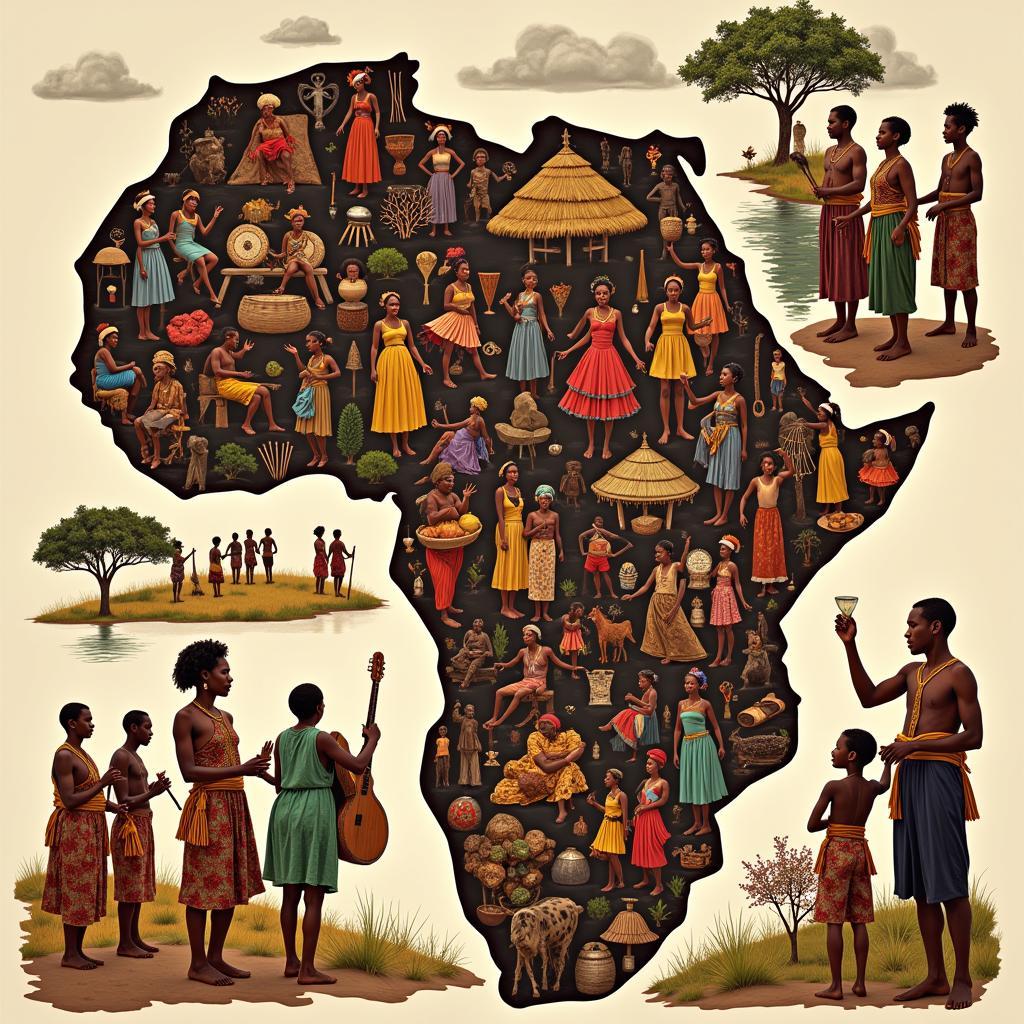Unlocking the Past: Advantages of Written Sources of African History
Understanding the Advantages Of Written Sources Of African History is crucial for a comprehensive view of the continent’s rich past. These sources, though often fragmented and biased, offer invaluable insights into the complexities of African societies, cultures, and political systems across centuries.
The Power of the Pen: How Written Sources Illuminate African History
Written sources offer a unique perspective on African history, supplementing oral traditions and archaeological findings. They provide specific dates, names, and details of events, allowing for a more nuanced understanding of historical processes. For instance, written accounts of the transatlantic slave trade offer harrowing details of the human cost and economic impact of this horrific period. These records, often kept by slave traders themselves, reveal the scale and brutality of the trade, even if they lack the perspective of the enslaved Africans. These sources complement oral histories, providing a more complete picture of the past.
Beyond the Colonial Lens: Diverse Written Sources of African History
It’s important to recognize that written sources of African history are not limited to colonial records. Pre-colonial African societies developed their own writing systems and produced a rich body of literature, including religious texts, legal documents, and royal chronicles. The Timbuktu manuscripts, for example, reveal a thriving intellectual tradition in West Africa centuries before European colonization. Similarly, Ethiopian chronicles document the long history of the Axumite Kingdom and the Solomonic dynasty. These indigenous sources provide a crucial counterpoint to colonial narratives and allow us to understand African history from an African perspective.
Navigating the Challenges: Critical Analysis of Written Sources
While written sources offer valuable insights, it’s essential to approach them with a critical eye. Many written records, especially those from the colonial era, reflect the biases and perspectives of their authors. Colonial administrators, missionaries, and explorers often viewed African societies through a distorted lens, portraying them as primitive or uncivilized. Historians must therefore carefully analyze these sources, considering their context and potential biases.
Unveiling the Hidden Voices: Contextualizing Written Records
To effectively utilize written sources, historians employ various methods of contextualization. They compare different accounts of the same event, cross-reference written records with oral traditions and archaeological evidence, and consider the social and political context in which the sources were created. By doing so, they can reconstruct a more accurate and nuanced understanding of the past, even when working with fragmented or biased material. This allows them to uncover the hidden voices and perspectives often marginalized in official historical narratives. African American homeschool moms can utilize these diverse sources to provide a rich and nuanced understanding of history to their children. Likewise, online African American bookstores are invaluable resources for finding books that explore African history from multiple perspectives.
The Future of African History: Preserving and Interpreting Written Sources
The preservation and interpretation of written sources of African history are ongoing projects. Many documents remain scattered in archives around the world, and efforts are underway to digitize and make them accessible to a wider audience. Furthermore, new discoveries are constantly being made, adding to our understanding of the continent’s past. As we continue to explore and interpret these sources, we can gain a deeper appreciation for the richness and complexity of African history. This exploration necessitates access to reputable sources and diverse perspectives. Online African American bookstores can be a valuable resource in this endeavor.
Conclusion: Written Sources as Keys to Understanding African History
The advantages of written sources of African history are undeniable. They provide valuable details, dates, and perspectives that complement other forms of historical inquiry. By approaching these sources with a critical eye and employing careful methods of contextualization, historians can unlock the secrets of the past and illuminate the rich tapestry of African history. Remember, understanding the past is crucial for shaping a better future.
FAQs
- What are some examples of pre-colonial African writing systems? Examples include Nsibidi, Ge’ez, and Tifinagh.
- How can I access historical documents related to Africa? Many archives have online databases and digitized collections.
- Why is it important to consider the bias in historical sources? Bias can distort historical narratives and marginalize certain perspectives.
- How do oral traditions complement written sources? Oral traditions offer different perspectives and insights, filling in gaps in the written record.
- What are some challenges in preserving written sources of African history? Challenges include limited resources, physical deterioration of documents, and political instability.
- How can I learn more about African history? Explore reputable online resources, visit museums, and consult with scholars. You might find useful resources at African American homeschool moms groups or African American bookstores online.
- What is the significance of the Timbuktu manuscripts? They demonstrate the rich intellectual history of West Africa before colonization.
If you need any assistance, please contact us:
Phone: +255768904061
Email: [email protected]
Address: Mbarali DC Mawindi, Kangaga, Tanzania.
We have a 24/7 customer service team.

